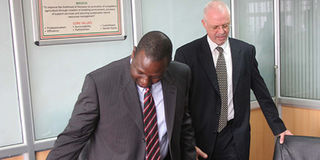EU pledges Sh10 billion for farming

Agriculture Minister William Ruto and head of European Delegation to Kenya Eric van der Linden during a press conference at Kilimo House in Nairobi on Tuesday. PHOTO/STEPHEN MUDIARI
The European Union has pledged to give Kenya Sh10 billion for improving agriculture.
Some of the areas earmarked for improvement include extension services and rural access roads that hinder farmers from delivering their produce to the market.
Extension services alone will be allocated Sh100 million according to Agriculture minister. The money will be used to enhance capacity by his ministry to deliver information on new farming technology to farmers.
“With new farming technology, our farmers will also enhance their productivity and turn their farming into business,” Mr William Ruto said.
Rich Kenya
He was addressing the press at his Kilimo House office yesterday after holding a meeting with a delegation from the European Union.
Head of EU delegation Eric Van Der Linden, who led the team said their interest is to see Kenya’s economy grow fast.
“We want a growing and rich Kenya for good political stability,” Mr Linden said.
To help farmers access markets, Mr Ruto said, rural access roads will be improved using the kitty, which will be available before the end of this year.
He said the fund will continue financing agriculture projects until 2013.
“There is a serious constraint for most farmers in the country in accessing markets because roads in the rural areas are sometimes impassable,” the minister said.
He cited sugar growing regions where farmers find it difficult to deliver their produce to millers due to the poor state of roads.
As a result, Mr Ruto announced that the Kenya Sugar Board will receive Sh150 million from the fund, which will develop access roads in the sugar growing zones.
Northern Kenya will also benefit from the EU fund where part of the money will be allocated to help develop drought resistant crops.
The crops, which are yet to be named, the minister said, will be supplementing livestock as a source of food. Communities in the region wholly rely on livestock as their economic mainstay.
“I will go to Marsabit to see the kind of crops being developed for this region by Kari (Kenya Agriculture Research Institute). We want to know the crops that can be grown in this region,” Mr Linden said.
He dispelled fears of plans by EU to drown Kenya’s market. “The fears are being expressed by some non governmental organisations and they are untrue,” he said.




